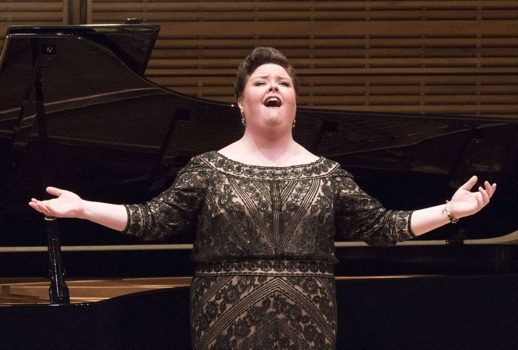
A woman-themed evening, as both authors and subjects of song
Dear Jamie Barton,
Last week at Zankel, as always, you made everyone want to bravo and swoon and scream-cry and also maybe phone a few dads to say it’s okay, all bygones now, we’re basically dead. I had a panic attack, that’s how moved you made me.
Dig: you’re the kind of singer that changes the way we think about mezzos in this century. You’re the kind of singer who brings us back to other centuries. Wanna know what it looks like when a bison stomps on a prairie dog? That’s pretty much you at every major international singing tourney this decade.
But also—and here, take it from one who is fully fruit-flavored—you’re the kind of singer who I believe will start to alter the way mezzos are construed for and marketed to gay men. That’s you, my dear, heralding a new homo/chest-singer affinity paradigm.
Query the boys about their love for you and answers will start to coalesce around three attributes:
- Your unpretentious, seemingly effortless and unmannered delivery of both aria and song, i.e. your capacity to tilt that melon head of yours back and sing alternately heartfelt, arch, or straight from the cooch.
- Your perky, toothy, dorky, Ethel Mermanian bearing onstage, as well as the way you still guffaw your way through recital patter and interviews. That straight-out-of-Indiana-grad-school, cat video-lovin’, Walmart thing you’ve still got going on, even though you’re a headliner.
- Your oddball penchant for showcasing totally fun mezzo characters who aren’t trouser roles.
Respondents also love your Southern belle slit eyes, your homespun pedigree (Rome, Georgia native, wassup!), your emoji-filled Twitter account, and the fact that you’re not at all above appearing at Albert Lepage’s on Fire Island for a performance of, what was it, can’t quite remember. “La bonne cuisine,” maybe? Scrumptious AND relatable.
To say nothing of the voice itself, which is, of course, a marvel. Rich and sonorous, but also vulnerable, it seems to emerge from the depths of the lower abdomen, as though lungs could start where legs ended, with tone shooting up from the floor. Young Jessye Norman’s voice had this quality. Whether conceived by Purcell or Berlioz, you match Jessye’s Dido, bosom-breath for bosom-breath. Though to be sure, only one of you will ever hold court in a taco headdress.
Still, lest you be marooned on the Isle of weepy baroque women forever, it turns out you’re also super versatile, with capacities extending far beyond the opera house. You perform well in most things. German lieder, French chanson, American showtunes: people still shut their eyes and massage their own shoulders when recalling, for instance, the Rückert-Lieder you performed at the Kennedy Center in 2009.
I happen to love your freshman recital album with pianist Brian Zeger, All Who Wander, which proves the old adage that good taste in programming trumps bad taste in cover art. What’s striking about this collection isn’t just how masterfully you handle the stylistic leaps from Mahler to Dvorak to Sibelius, but also how you are able to reconcile a scaled-back lieder album with a dramatic mezzo built for the rafters.
Compare, for instance, your take on Sibelius’ “Var det en dröm?” on the recording vs. your rendition of the same miniature at the 2013 Cardiff competition. The burbling intricacies of the piano massage the intimate cadences of your voice on the album; whereas against Cardiff’s full orchestra, you put Sibelius’ final declamation—about holding on to the evanescent memory of love—on full blast, lending it an orgasmic, near-Straussian sensuousness.
Sexing up Finnish romanticism at Cardiff. G-A-Y.
Some of us knew all along you’d be big. Long before the BBC and Richard Tucker awards made you A list, when you were a still just a shadowy, high-fivin’ extra on the set of the Met’s Michael Fabiano snuff film The Audition, the elements of an operatic set-chewer were already in place.
Critics will continue to compare you to other stage beasts like Traubel and Flagstad—all fair throwback references, as you don’t sing in the cowed, sepulchral way of a lot of our generation’s mezzo. (People like to compare you to Horne because you’re both robust-diaphragmed middle voices who’re good at bel canto and seem similarly bubbly and all-American. Also, you kinda look like her.)
And yet there’s more. You’re different from all those Gen X mezzos—Graham, von Otter, even Gens—as you perform astonishingly well in Italian bel canto and grande opera, in roles that demand considerably more dramatic heft. I’ve never heard a more thrilling “Acerba voluttà” than yours. You put the Giovanna in Jane Seymour.
Gone are the days when mezzos could only play Delilah or reedy page boys. Now we not only allow for mezzo headliners who sing large and in charge; we relish them, and look for voices that burst forth from the solar plexus.
Can I take a T.O. to note how much I fucking love you and Meade together as spurned Druids? Like two paunchy barn cats, prowling sluggishly around on McVicar’s dimly lit stage, only to meet underground for big-girl hugs, and one of them good ol’ fashioned, proto-Jerry-Herman hootenannies. Really, it’s the best thing.
Trouser roles may be queer, but Jamie Barton vamping and cackling her way through Ježibaba is for fucking homosexuals.
Anyhow, you’re the kind of singer who brought a throng of gay people (and Joyce DiDonato) to Carnegie Hall last Monday night for a mostly smartly programmed recital in memory of wartime mezzo Jula Goldyne (née “Goldwurm,” yuck).
There you were in your weird, downbeat black-and-gold Grecian brocade dress, your hair swept up in a chignon, with your usual collaborator Kathleen Kelly at your side, two women primed for a woman-themed evening, as both authors and subjects of song.
The program’s first half brought us four turn-of-the-century gems by women composers, plus a manic-depressive Haydn cantata about Ariadne. You opened your program with Elinor Remick Warren’s bucolic “Heather,” whose arpeggios spun a rich aubade that perfectly ushered in works by Amy Beach and the Boulanger sisters.
Lili Boulanger’s gorgeous, Debussyesque chanson “Attente,” a nocturne that opens out like a flower, sets an aching, erotic Maeterlinck poem written from the male perspective to meandering broken chords. Gosh, why don’t more mezzos sing Lili Boulanger? Riveting stuff.
Lengthy Haydn cantatas aren’t typically my thing, but yours was a good character study of an abandoned princess, moving baroquely from despair to hope to rage, with a perfect mesa di voce on lines about your heart quivering in your breast.
After intermission, we got a world premiere of the Carnegie Hall-commissioned six-song cycle, “of you” by Iain Bell, featuring poems by E. E. Cummings. You know what’s really not my thing? Cutesy-precious refrigerator magnet poetry written by people who never met an enjambment or lower-cased letter they didn’t like.
I FUCKING HATE E. E. CUMMINGS. I also hate that wunderkind composers like Iain Bell still think it’s okay to set his “lady,i will/touch you with my mind” big bag of bs to music.
But you didn’t disappoint. Bell writes for the keyboard in extremes, often coloring lyrics like “wee skipping high-heeled flames/courtesied before my eyes” (ugh) and “i like kissing this and that of you” (barf, and also: this song was definitely me the other day) with twinkles and ostinatos at the top and bottom of the piano.
Locked arm in arm with Bell at the end of the cycle, the two of you skip-minced off the stage together, glad as we were, I suppose, that it was over.
Libby Larsen’s “Love after 1950”—with its gimmicky, Dawn Upshaw-ready matching of musical style to lyrical content (honky-tonk, habanera)—is old terrain for you. It’s a fun song cycle to make fun of, because it’s campy and full of Broadway. But with “The Empty Song,” a sad, longing piece about a lost lover’s preferred shampoo running out, you were transcendent and made me blubber. I’ll never wash the same way again.
The last three songs of your set supplied an especially boozy rendition of Ravel’s seguidilla, “Chanson à boire”; a shapely and enchanting “Phidylé” by Duparc, with its gorgeous pianistic swoon at the end; and “Cäcilie” performed in one breath.
The Adriana Lecouvreur aria encore was magic. Yet if there were ever any chance that I might not love you enough, Jamie, please know that singing “Never Never Land” from Peter Pan is one way to win me fully. I’m no savant, but I do know a friend of the fairies when I see one. You’re the kind of singer from where dreams are born and time is never planned.




